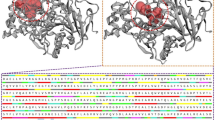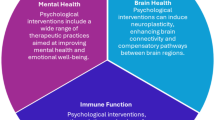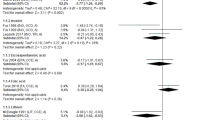Abstract
Salvia officinalis (sage) has previously been shown both to possess in vitro cholinesterase inhibiting properties, and to enhance mnemonic performance and improve mood in healthy young participants. In this double-blind, placebo-controlled, crossover study, 30 healthy participants attended the laboratory on three separate days, 7 days apart, receiving a different treatment in counterbalanced order on each occasion (placebo, 300, 600 mg dried sage leaf). On each day mood was assessed predose and at 1 and 4 h postdose. Each mood assessment comprised completion of Bond–Lader mood scales and the State Trait Anxiety Inventory (STAI) before and after 20 min performance of the Defined Intensity Stress Simulator (DISS) computerized multitasking battery. In a concomitant investigation, an extract of the sage leaf exhibited dose-dependent, in vitro inhibition of acetylcholinesterase and, to a greater extent, butyrylcholinesterase. Both doses of sage led to improved ratings of mood in the absence of the stressor (that is, in pre-DISS mood scores) postdose, with the lower dose reducing anxiety and the higher dose increasing ‘alertness’, ‘calmness’ and ‘contentedness’ on the Bond–Lader mood scales. The reduced anxiety effect following the lower dose was, however, abolished by performing the DISS, with the same dose also being associated with a reduction of alertness during performance. Task performance on the DISS battery was improved for the higher dose at both postdose sessions, but reduced for the lower dose at the later testing session. The results confirm previous observations of the cholinesterase inhibiting properties of S. officinalis, and improved mood and cognitive performance following the administration of single doses to healthy young participants.
Similar content being viewed by others
Log in or create a free account to read this content
Gain free access to this article, as well as selected content from this journal and more on nature.com
or
References
Ahearn EP (1997). The use of visual analog scales in mood-disorders: a critical review. J Psychiatr Res 31: 569–579.
Akhondzadeh S, Noroozian N, Mohammadi M, Ohadinia S, Jamshidi AH, Khani M (2003). Salvia officinalis extract in the treatment of patients with mild to moderate Alzheimer's disease: a double blind, randomized and placebo-controlled trial. J Clin Pharmacy Therap 28: 1–7.
Bond A, Lader M (1974). The use of analogue scales in rating subjective feelings. Br J Psychol 47: 211–218.
Ellman GK, Courtney KD, Andres V, Featherstone RM (1961). A new and rapid colorimetric determination of acetylcholinesterase activity. Biochem Pharmacol 7: 88–95.
Giacobini E (2004). Cholinesterase inhibitors: new roles and therapeutic alternatives. Pharmacol Res 50: 433–440.
Grutzlender J, Morris JC (2001). Cholinesterase inhibitors for Alzheimer's disease. Drugs 61: 41–52.
Kennedy DO, Little W, Scholey AB (2004). Attenuation of laboratory induced stress in humans following acute administration of Melissa officinalis (Lemon Balm). Psychosomatic Med 66: 607–613.
Kennedy DO, Scholey AB (2005). Sage and brain function. Nutr Abstracts Rev: Series A 75: 25–31.
Kennedy DO, Scholey AB, Tildesley NTJ, Perry EK, Wesnes KA (2002). Modulation of mood and cognitive performance following acute administration of single doses of Melissa officinalis (Lemon Balm). Pharmacol Biochem Behav 72: 953–964.
Kennedy DO, Wake G, Savelev S, Tildesley NTJ, Perry EK, Wake G et al (2003). Modulation of mood and cognitive performance following administration of single doses of Melissa officinalis (Lemon balm) with human CNS nicotinic and muscarinic receptor binding properties. Neuropsychopharmacology 28: 1871–1881.
Keppel G (1991). Design and Analysis. Prentice Hall: New Jersey.
Perry EK, Pickering AT, Wang WW, Houghton PJ, Perry NSL (1999). Medicinal plants and Alzheimer's disease: from ethnobotany to phytotherapy. J Pharmacy Pharmacol 51: 527–534.
Perry N, Court G, Bidet N, Court J, Perry E (1996). European herbs with cholinergic activities: potential in dementia therapy. Int J Geriatric Psychiatr 11: 1063–1069.
Perry NSL, Bollen C, Perry EK, Ballard C (2003). Salvia for dementia therapy: review of pharmacological activity and pilot tolerability clinical trial. Pharmacol, Biochem and Behav 75: 651–659.
Perry NSL, Houghton PJ, Jenner P, Keith A, Perry EK (2002). Salvia lavandulaefolia essential oil inhibits cholinesterase in vivo. Phytomedicine 9: 48–51.
Perry NSL, Houghton PJ, Sampson J, Theobald AE, Har S, Lis-Balchin M et al (2001). In vitro activities of S. lavandulaefolia (Spanish Sage) relevant to treatment of Alzheimer's disease. J Pharmacy Pharmacol 53: 1347–1356.
Perry NSL, Houghton PJ, Theobald A, Jenner P, Perry EK (2000). In vitro inhibition of human erythrocyte acetylcholinesterase by Salvia lavandulaefolia essential oil and constituent terpenes. J Pharmacy and Pharmacol 52: 895–902.
Savelev SU, Okello EJ, Perry EK (2004). Butyryl and Acetyl-cholinesterase inhibitory activities in essential oils of Salvia species and their constituents. Phytother Res 18: 315–324.
Savelev S, Okello E, Perry NSL, Wilkins RM, Perry E (2003). Synergistic and antagonistic interactions of anticholinesterase terpenoids in Salvia lavandulaefolia essential oil. Pharmacol Biochem Behav 75: 661–668.
Speilberger CD, Gorsuch RL, Lushene RE (1969). The State Trait Anxiety Inventory Manual. Consulting Psychologists Press: Palo Alto.
Tildesley NTJ, Kennedy DO, Perry EK, Ballard C, Savelev S, Wesnes KA et al (2003). Salvia lavandulaefolia (Spanish Sage) enhances memory in healthy young volunteers. Pharmacol Biochem Behav 75: 669–674.
Tildesley NTJ, Kennedy DO, Ballard CG, Wesnes KA, Hylands P, Perry EK et al. Sage improves memory and attention in healthy older volunteers: a controlled double blind acute study (submitted).
Tildesley NTJ, Kennedy DO, Perry EK, Ballard C, Wesnes KA, Scholey AB (2005). Cognitive and mood effects of acute administration of Salvia lavandulaefolia (Spanish Sage) to healthy young volunteers. Physiol Behav 83: 699–709.
Wetherell MA, Sidgreaves MC (2005). Secretory immunoglobulin—A reactivity following increases in workload intensity using the Defined Intensity Stress Simulator. Stress Health 21: 99–106.
Wilcock GK, Lilienfeld S, Gaens E (2000). Efficacy and safety of galantamine in patients with mild to moderate Alzheimer's disease: multicentre randomised controlled trial. Galantamine International Study Group. BMJ 321: 1445–1449.
Acknowledgements
Materials and a contribution towards the direct costs of the study described herein were provided by MedicHerb, Marlow, Buckinghamshire, UK.
Author information
Authors and Affiliations
Corresponding author
Rights and permissions
About this article
Cite this article
Kennedy, D., Pace, S., Haskell, C. et al. Effects of Cholinesterase Inhibiting Sage (Salvia officinalis) on Mood, Anxiety and Performance on a Psychological Stressor Battery. Neuropsychopharmacol 31, 845–852 (2006). https://doi.org/10.1038/sj.npp.1300907
Received:
Revised:
Accepted:
Published:
Issue date:
DOI: https://doi.org/10.1038/sj.npp.1300907
Keywords
This article is cited by
-
Evidence for anti-inflammatory effects and modulation of neurotransmitter metabolism by Salvia officinalis L.
BMC Complementary Medicine and Therapies (2022)
-
RETRACTED ARTICLE: Anti-oxidant and hepatoprotective effects of Salvia officinalis essential oil against vanadium-induced oxidative stress and histological changes in the rat liver
Environmental Science and Pollution Research (2021)
-
Phytochemicals for Improving Aspects of Cognitive Function and Psychological State Potentially Relevant to Sports Performance
Sports Medicine (2019)
-
Les antispasmodiques en phytothérapie
Phytothérapie (2017)



